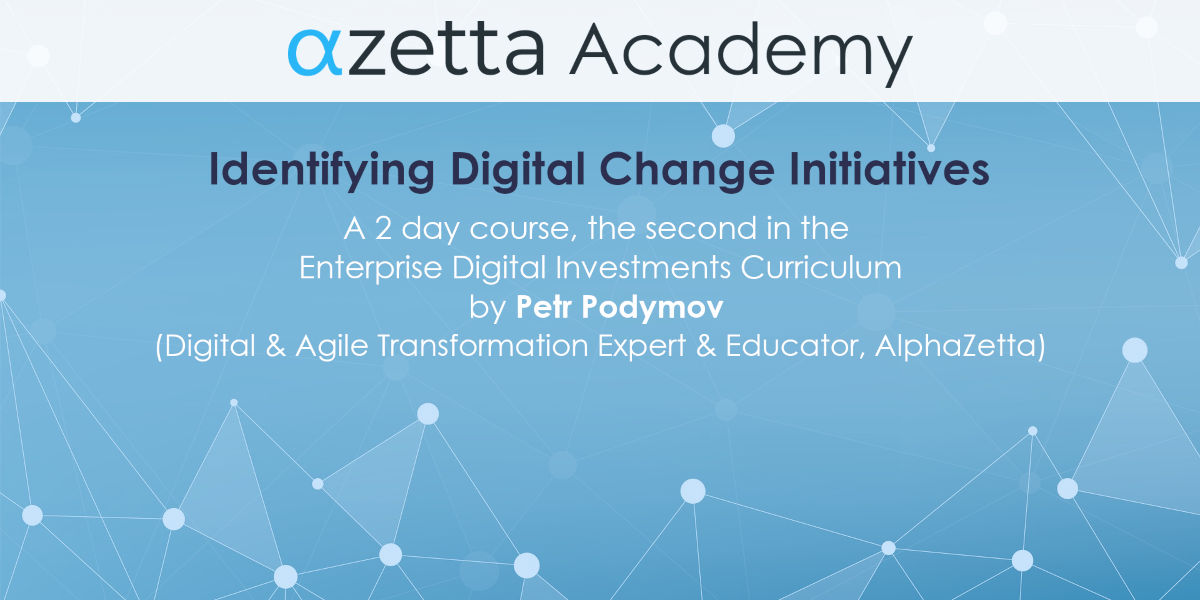This course provides a practical framework for identifying digital change initiatives with enterprise analysis to highlight opportunities where real change is needed within the organisation. The framework covers how to appropriately prioritise these opportunities, identify missing competencies and resource them, and then how to evaluate and propose digital change solutions. The course concludes with how to devise and plan an appropriate implementation strategy and trajectory.
Digital transformation demands constant improvement of the customer journey, ecosystem and operational efficiency enabled by decent technology. New digital change initiatives need feasible and efficient digital solutions that are in line with an organisation’s business goals and technology strategy so that they can become a regular part of daily business.
Enterprise analysis is an essential primer for identifying and introducing new digital initiatives. Attendees of this 2 day training course will learn to identify key problems or opportunities, and discover strategies to find and assess solutions that do not reinvent the wheel.
The course does not require specific analytical or architectural skills. Your trainer will provide very practical guidance on:
- how to fairly assess a situation
- identify the real needs in the organisation
- assign the right priorities
- engage additional competencies and
- propose a solution and implementation trajectory that makes sense.
The course is based on real company case studies and will fit the theory to the students’ business issues. It is the second in the Enterprise Digital Investments Curriculum.
Day 1: Foundations of digital initiatives
1. Digital transformation term clarification
- Market demand for digital transformation – retail and finance examples
- Metrics of digital transformation
- Real-life cases discussion
- Calculate a ‘Digital Score’
2. Systematic approach to enterprise analysis and solution selection
- Goals of enterprise architecture
- Analysis using BIAT: business information application technology
- Enterprise architecture lifecycle (ADM)
- Vision of target state – business first
3. Problems and opportunities evaluation
- Business architecture framework
- Impact on strategy – simple usage of KPIs
- Values streams and capabilities mapping
- Domain organisation concept
- Visualise the structure of your business field
- Identify priority areas to focus on (they should fit with your vision)
4. Data-driven change management
- The information model and why it matters
- ‘Event storming’ – the basics
- Data-driven process management concept
- Structure your subject area (domain context)
- Map the business initiative to your information model
Day 2: Solutions for digital initiatives
1. The Swiss Army Knife of typical digital solutions
- Customer management
- Business process management
- Big Data, BI and data governance
- BIAT aspects for all – not just in IT
2. How to align with IT strategy and IT organisation
- Major technology roles supporting transformation
- Typical patterns to structure the enterprise IT landscape
- Monolith & microservices: myth & reality
- Cloud strategy: understand way of deployment
- Additional competencies you need to engage
- Placing a typical solution into given landscape
3. Evaluate and explain the solution’s fit for the opportunity or problem
- Introduction to SPIN: Situation Problem Implication Need Payoff
- Success planning – define criteria upfront
- Cost of risk: assumptions vs. constraints
- Solution feasibility study
- Justify your solution from SPIN perspective
4. Implementation approach
- Briefly about Scrum, Kanban, Waterfall
- Cynefin framework introduction
- Looking for planning patterns
- Rollout: PoC, piloting, continuous improvement
- Determine implementation trajectory
Additional Information – Identifying Digital Change Initiatives
| Audience | Expert, Business, Management
This course aimed at companies with significant investments in enterprise technology or that are making efforts to improve change management. It is for managers and experts involved in digital transformation, project and product managers, team leads, solution and enterprise architects, mid-level line managers, external IT consultants. |
| Prerequisites | Participants should have experience in project/product/team management and in working with enterprise technology within an organisation. Ideally they have also completed course 1 (Enterprise Digital Portfolio Management) from this curriculum. |
| Objective | Learn a straight-forward way to analyse your enterprise and find solution that fits- Objectively assess the company situation
- Find areas of improvement that really matter
- Propose solutions that fit the problem
- Base continuous improvements on data
|
| Format | Class |
| Duration | 2 days in-person, 4 part-days online |
| Course Author | Petr Podymov |
| Trainer | Courses are taught by Petr Podymov and/or his hand-picked team of highly skilled instructors. |
| Delivery Method | Online, in-person at AlphaZetta Academy locations or on-premise for corporate groups |
Our online courses run as live online meetings using Zoom for the video meeting part and Microsoft virtual computers for the practical components. The benefit of having a live trainer for online training is you can ask questions, obtain mentoring from the trainer and interact with classmates.
Course participants will require the following technologies and online accounts. Please check that your setup satisfies these requirements:
- Course participants will require the following technologies and online accounts:
- Reliable computer (Windows, Mac or Linux)
- Webcam (to help facilitate the mentoring aspect of our training)
- Reliable internet access
- A quiet space
- Zoom video conferencing software and Zoom account (register and pre-install the software at zoom.us)
- Microsoft account in order to access the virtual lab PCs (Existing or new account. There’s nothing to be installed, you just need an account to sign-in with.)
Meals and refreshments
Face-to-face courses: Catered morning tea and lunch are provided on both days of the course. Please notify us at least a week ahead if you have any special dietary requirements.
Feedback
Use academy@alphazetta.ai to email us any questions about the course, including requests for more detail, or for specific content you would like to see covered, or queries regarding prerequisites and suitability.
If you would like to attend but for any reason cannot, please also let us know.
Variation
Course material may vary from advertised due to demands and learning pace of attendees. Additional material may be presented, along with or in place of advertised.
Cancellations and refunds
You can get a full refund if you cancel 14 days or more before the course starts. No refunds will be issued for cancellations made less than 14 days before the course starts.
Frequently asked questions (FAQ)
Do I need to bring my own computer?
This is dependent on the venue. Please check the course event page.
Why do I need to provide a shipping address?
For online courses, we need an address to send you the course notes that you need for the course.
Discounts
Face to face public courses: early bird pricing is available until 2 weeks prior. Group discounts: 5% for 2–4 people, 10% for 5–6 people, 15% for 7–8 people, and 20% for 9 or more people. Discounts are calculated during checkout.
Online public courses: available at a 25% off the face-to-face courses as a special introductory price. to groups or to individuals who want to follow a curriculum program and attend multiple courses:
- 2-4 courses/attendees 10% off
- 5+ courses/attendees 20% off
Hurry as bookings will close 1 week before each course. Group discounts are calculated during checkout on individual courses. Individuals can book multiple courses at a discount – please enquire.
Course Booking Terms and Conditions
Private and Corporate Training
In addition to our public seminars, workshops and courses, AlphaZetta Academy can provide this training for your organisation in a private setting at your location or ours, or online. Please enquire to discuss your needs.

Based in Russia
Petr is a seasoned Enterprise Architect with a focus on planning, explaining and justifying structural investments in business and technology change and transformation programs. He has more than 15 years’ experience in banking, retail and education industries. Since 2011 he has focussed on digitally oriented organisational transformations, having worked his way through business process management to become a project portfolio leader, then a management consultant and CIO.
Petr has played an expert role in several huge-scale PMO establishment initiatives. Once demand for agile-transformation appeared, he participated in advanced governance model creation with enterprise agility pioneers of their industry: Sberbank of Russia and Leroy Merlin. Petr is also a university lecturer in magistracy and new course author since 2015 and develops education programs for professional audiences.



